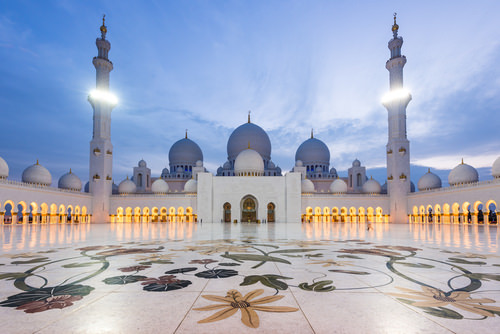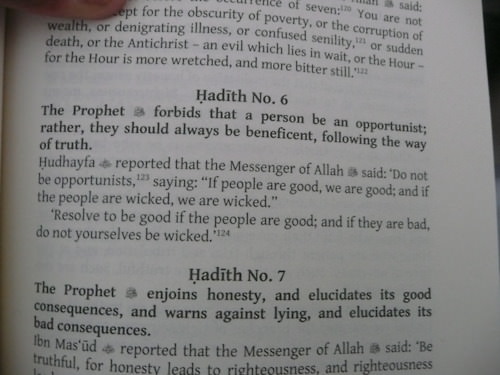Family and Community
Reforming the Masjid Constitution
Published
By
Guests
By Dawud Israel
It will probably come as no surprise that there is a growing desire to improve the masjid experience in the West. Many speakers have commented on the problems that arise from living in the complex, multi-cultural, pluralistic setting of the masjid and what it says about the future of Islam in the West. Will we survive? If so, will we grow stronger with each successive generation or weaker? Some have even given suggestions, such as Nouman Ali Khan, but no one has really posed a real sure-fire solution.
One method worth taking a look at is modifying the constitution or charter of the masjid, a document which many masājid had drafted and ratified in their infancy. It probably was not seen as a very important document at the time it was created, but in the West as anybody knows, the constitution is the bedrock and foundation of society. It is both a symbol and standard of values and excellence. This is all the more for Muslims when it is based on the Qur’an, Sunnah and the legacy of the righteous (saaliheen).
Keep supporting MuslimMatters for the sake of Allah
Alhamdulillah, we're at over 850 supporters. Help us get to 900 supporters this month. All it takes is a small gift from a reader like you to keep us going, for just $2 / month.
The Prophet (SAW) has taught us the best of deeds are those that done consistently, even if they are small. Click here to support MuslimMatters with a monthly donation of $2 per month. Set it and collect blessings from Allah (swt) for the khayr you're supporting without thinking about it.
Religious communities in the West must operate as community organizations, and this means they have to set standards and function as a community among the rest of society. Much is subject to change: the administration, the management, the building itself, the ethnic and cultural makeup–but the constitution will always be attached to that community. It will be there 10 years from now, and even, inshā’Allāh, 100 years from now. Every once in a while that constitution will have to be updated for obvious reasons. If you can get the masjid management to review the constitution, then that is your ticket to making real community changes inshā’Allāh. And this is the route I took with my community. I will discuss how you can go about something similar in your Muslim community.
Assessing your Community
When you approach the re-writing of the masjid constitution, you need to keep in mind your personal experiences with the community. Think about the positive aspects and the negative aspects. Also consider the criticism you have heard from fellow Muslims because it will often provide great insight. But keep in mind, not all criticism is equal- some of it may be from a brother having a bad day, or a community elder experiencing a bout of homesickness for the land of his/her birth, etc. Each community is different and to be fair to that community, one cannot impose changes based on one’s own ideas and perceptions. Rather the constitution must reflect the needs of those people–it must reflect their actual experience, not your perception of their experience. In order to achieve this, you must carefully pick up on vibes and have first-hand interaction with people. Hear them out one-on-one, rather than relying on second or third-hand rumors. This is crucial since your goal is to remedy with a cure, not to spread scandal.
My experience was unique because I recalled the experiences of myself as a youth, a community worker and volunteer and someone who’d seen people come and go. I knew how converts, children and females felt. I knew how incompetent Muslim community leadership can be – the rigors, the sloppy standards and yet the well-meaning intentions of all involved.
Approaching the Masjid Constitution
Your first step is to thoroughly explore the masjid constitution document, goals, objectives, procedures, membership, voting, etc.– much of it, at least in my experience, was sadly focused on enshrining power and it left a lot of leeway for the management. Very few responsibilities are made explicit and there are few external checks and balances. Many communities have inner politics and the constitution is what can limit or permit that. The very structure of the constitution– what it focuses on, what it says, and most importantly what it does not say often is what opens the door to power struggles and corruption.
Be clear: this is about constitutional change, the future of the community, and not what is already being done or being self-congratulatory.
Obstacles in Rewriting the Masjid Constitution
Just because certain responsibilities are being discharged does not make them a permanent feature of the masjid. The executive may see them as optional as if they are doing the community a favor. In order to make them permanent, they have to be written into the constitution as a responsibility to be discharged by the masjid management. Most constitutions are already sufficiently flexible and open, so why not make them as detailed as possible in terms of responsibilities?
People will also feel they need to create the constitution in the image of a non-Muslim constitution or in the image of a Muslim constitution or both, and they will be indecisive as to which path to take. This is what W.E.B Dubois called, “double consciousness“ and it means both are approached half-heartedly which dilutes the efficacy of the document severely. What this means is they weren’t ready to go to the fullest extent possible in fulfilling the needs of the community in the document since they felt it had to look like a non-Muslim constitution. “What sort of things do people put in this document? Is that what other people do? Should we say shura board or executive board?” This is a mindless, trivial, superficial approach to the constitution that focuses on non-issues and goes nowhere. If the mentality is, “Let’s imitate non-Muslims” as if it’s taqlid or that it is the best way to go about it, then it’s doomed. We are Muslims and we have different needs and aims. And if it’s about being presentable to non-Muslims, then no matter how you spin it, it is unlikely that non-Muslims will understand every single detail about our experience. No matter which way you slice it, this is a constitution for the House of Allah and this document belongs to the local Muslim community and not to anyone else –it should reflect the community entirely, without any insecurity or inferiority complexes inscribed into it. If we do not present ourselves, our aspirations, our commitment to the Qurʾān and Sunnah, in that constitution, then where else can we present it and what does that say about us? So it is important to make that document ours.
So if we aren’t going to blindly replicate a non-Muslim constitution, what model can we follow?
The approach or paradigm you need to bring in is that of policy changes or public policy. Think of the Wikileaks reports– how do they state honest observations, cite recommendations or comments, and explain why that is the best route to take based on knowledge and feasibility? This is extremely pragmatic and is really a powerful tool.
Guiding Principles
- Compare your constitution to the constitution of other religious communities– synagogues, churches, parishes, temples, etc.
- Look for external checks and balances–police officers, other local masājid, madrassas, reliable Islamic institutions overseas
- Does the constitution actually oblige any substantial results that are beneficial to the community? Or does it cast the impression of being merely a suggestion of duties?
- Does it advocate a certain interpretation of Islam and is that hurting the community? Or is it simply disagreeable to some and ultimately a matter of preference? Is the community open to other interpretations of Islam? Are they generally more open-minded or narrow-minded? What strategies can you try in that environment?
- Is it fair to expect that the community will be able to take responsibility for all the constitutional changes and put them into action? Or is it too much for the community to achieve?
- What are the implications of certain alterations to the constitutions inside the document? How does changing one clause necessitate modifying the other clauses?
- Think about the positive aspects and the negative aspects– what are the strengths and weaknesses? Will certain changes jeopardize the good things your community has going on? Are some things simply unrealistic to change?
- Keep in mind: all you are changing is the constitution, not the people. So as promising as this solution is, it is not the be-all end-all; there still need to be good intentions at play.
This should give you a pretty good start. As you proceed, you will need to come up with solutions. Here are some I came up with.
Needs of the People
- Education, assimilation and support of convert Muslims into the Muslim community which is crucial to establishing Islam
- Mediation position for resolving conflicts that may often flare up in the community
- Mosque visitors have access to religious apparel for their visit and visitor cards so they aren’t mistaken for Muslims
- Females must be accommodated including:
- Being given time and space for private female-only events
- Have access to the Imam for their questions and concerns (“equal opportunity Imam” as opposed to male-only Imam)
- Consulted and surveyed issues surrounding the prayer area barrier, if the community has one. This means being given adequate space for prayer, access to speakers during events, and if a barrier is implemented then making the barrier “people-friendly” and attractive (use house plants, folding screens, or room dividers)
Community Programs
- Halaqas and seminars that focus on contemporary Muslim problems such as family education and youth issues. Key topics may be parenting, youth, drugs, immigration, cultural baggage, racism, generational differences, etc. Often immigrant parents are left helpless not knowing how to confront these problems when they show up in their families and the masjid needs to be there to assist them. If we continue to neglect these pertinent issues, we are jeopardizing the future of Islam in North America.
- Giving life to the Masjid library including having a book club, stock of new books, spare reading glasses close to the Qur’ans for the elders, etc.
Relationships
- Outreach and Philanthropy such as blood donations, offering connections with social workers, visiting senior citizen homes, recycling, soup kitchens, etc. You can never do too much of this.
- Developing relationships with political leadership, ethnic leaderships and the leadership of other masājid and Islamic organizations.
- Staying connected to city events– cancer runs, sports events, marathons, seasonal volunteering, etc.
- Establishing a liaison with public school boards to accommodate the needs of Muslims students (prayer, fasting, hijab) and combat Islamophobia. Most Muslim children attend public schools as opposed to Islamic schools and are left to fend for themselves.
- Referring to consultants such as seminaries, educational institutes, teachers and shuyukh.
Leadership
If you have managed to persuade your Masjid leadership to review the constitution, most likely it was because they wanted to address leadership issues, even if they didn’t say it outright. A few things you should set in regards to leadership issues:
- A term limit for maintaining office
- Installing safeguards in regards to transparency and accountability, and if it’s been an issue, then definitely making sure there is adequate funding and training for programs.
- Most masājid also have difficulty with their Imams, for whatever reason and they often end up getting fired randomly. One way to approach this problem is to assess the Imam on certain criteria and inform him of it ahead of time. Evaluate the Imam at the end of the year on the results he’s produced in the community. Or alternatively, ask the Imam what goals he has for the year and then assess him based on whether he met those goals or not. One strategy that the Jewish community employs in their constitution is to give their rabbi a trial period and then establishing him/her as the permanent rabbi of the community if they approve of his performance.
- Assess the masjid executive board on similar criteria.
Concluding Remarks
Be patient. You must be calm, cool-headed, rational and ready to push your ideas hard without offending others and be willing to compromise. Think of the Prophet 

So what are your experiences with your community?
Subhana kallahumma wa bihamdika ash-hadu allaa illaha illa ant astaghfiruka wa atubu ilayk, ameen.
This article is a cross-post originally posted here.
Keep supporting MuslimMatters for the sake of Allah
Alhamdulillah, we're at over 850 supporters. Help us get to 900 supporters this month. All it takes is a small gift from a reader like you to keep us going, for just $2 / month.
The Prophet (SAW) has taught us the best of deeds are those that done consistently, even if they are small. Click here to support MuslimMatters with a monthly donation of $2 per month. Set it and collect blessings from Allah (swt) for the khayr you're supporting without thinking about it.

Nationalism And Its Kurdish Discontents [Part II of II]: Kurds And Turkiye After Ottoman Rule

Nationalism And Its Kurdish Discontents [Part I of II]: Kurds In An Ottoman Dusk

Moonshot [Part 10] – The Marco Polo

Moonshot [Part 9] – A Religion For Real Life

Genocidal Israel Escalates With Assault On Iran

Moonshot [Part 9] – A Religion For Real Life

Moonshot [Part 10] – The Marco Polo

Moonshot [Part 8] – The Namer’s House

Moonshot [Part 7] – The Abyss Stares Back

Moonshot [Part 6] – Down These Mean Streets

[Dhul Hijjah Series] Calling Upon the Divine: The Art of Du’a (Part 1)

IOK Ramadan 2025: Four Steps | Sh Zaid Khan

IOK Ramadan 2025: Do Your Best | Sh Zaid Khan

IOK Ramadan 2025: Giving Preference to Others | Sh Zaid Khan










Mel
June 20, 2014 at 10:58 AM
… “The constitution must reflect the needs of those people–it must reflect their actual experience, not your perception of their experience. In order to achieve this, you must carefully pick up on vibes and have first-hand interaction with people. Hear them out one-on-one, rather than relying on second or third-hand rumors. This is crucial since your goal is to remedy with a cure, not to spread scandal”…..Perfect advice! Now let’s see who follows it..
almarwa
June 21, 2014 at 3:13 AM
Assalam alaykum
Why reforming the Masjid constitution?
All our needs & all the answer can be found in Muhammad Salallahou alayhi wasalam. We just have to come back to the fundament, come back to the Sunna.
Hammel
June 21, 2014 at 4:17 AM
Good advice mashallah. It would also be beneficial if you could write more about the how you went about changing your community masjid’s constitution since you mentioned that you did. You could even provide the constitution of a successful multi cultural masjid as a template.
Brother Dawud, I have been following you on facebook for awhile now, and I have always noticed that you speak (or write) more in generalities rather than speaking from your direct experience. Why is that?
You will connect more with readers if you share more of yourself and you experiences, mistakes and all. Showing vulnerability creates a strong rapport with people.
I mean, even your short bio section is missing.
There is a good talk from the TED talk series entitled “vulnerability” on youtube
You will benefit from it.
Jazakallah khair
Ikbal
June 21, 2014 at 9:47 AM
This is the vulnerability video
http://www.youtube.com/watch?v=iCvmsMzlF7o
istikhara Online
December 18, 2019 at 9:29 AM
Your are doing well. the Good advice mashallah
Dawud Israel
June 27, 2014 at 1:02 PM
Salam. Thanks for the video. Yeah I plan on writing more insha’Allah about it as time goes on. Its a learning experience. I don’t want to project one masjid template on all the masjids either so its why I am more open.